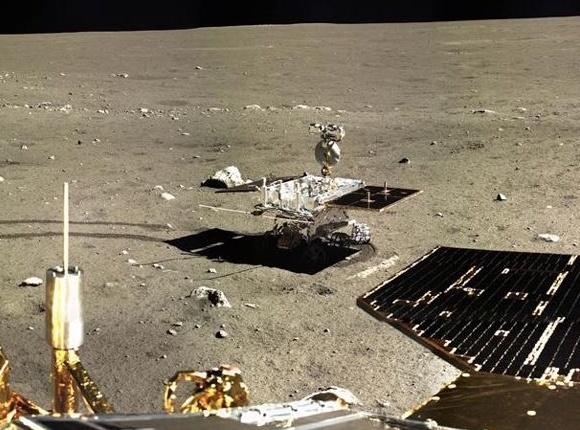 |
| Chang'e-3 lunar lander Panoramic Camera image, from a sequence released January 17. (Click on image for a wider mosaic) [Chinanews.com]. |
[From China Daily - January 17 (UT)] The Chang'e-3 lunar lander and rover "Yutu" have begun their long-term science mission, and will have their durability tested as it continues a survey of its landing site in northwest Mare Imbrium, sources with the Beijing Aerospace Control Center said Thursday.
The center transferred operations of the probe to a smaller management team Wednesday night, said Cui Yan, who leads the team. "We have made all the hardware and software ready for the long-term control tasks and have developed new management methods," Cui said.
Liu Junqi, one of the chief engineers on Cui's team, said during the yearlong mission the team will coordinate deep-space control stations around the nation and closely monitor the Chang'e-3 lander and Yutu to arrange scientific missions on the lunar surface.
One of major responsibility for the team is to put the lander and rover into sleep mode as the long lunar night descends and re-awaken the vehicles and their science instruments after local sunrise, Liu said. Night on the moon lasts two weeks, and the surface temperatures quickly fall below -180° C, and there is no sunlight to provide power from solar panels.
"The transfer of control marks the successful completion of the probe's first stage of exploration and scientific missions," said a publicity officer at BACC, who refused to be named. He said, under the long-term management mode, the lander and rover don't need a lot of people to take care of them. Cui's team, which has less than 20 people, is able to take over from the current large control group.
"Next, the team will control the probe to perform scientific operations that can last several months. Engineers will test whether the lander and rover can function well over a long period and whether they can live up to their designed life span," the officer added. "During the yearlong period, the team's controllers and engineers will work about 15 consecutive night shifts each month, so this is really a tough job."
Yutu, the "Jade Rabbit" lunar rover, has a designed lifespan of three months, and the lander is expected to work for one year.
After waking up following nearly two weeks of dormancy, Yutu completed its first sampling of lunar soil using its mechanical arm Tuesday, January 14, the Beijing center said. "Accuracy control of the mechanical arm at a distance of 380,000 kilometers has been realized, marking China's breakthrough in controlling a mechanical arm with high precision on the lunar surface," said Wu Fenglei from the center.
Yutu will continue to survey the moon's geological structure and surface substances and look for natural resources, while the lander will explore the landing site until the end of its life span.
Related:
Preliminary Science Results from Chang'e-3 (January 16, 2014)
The center transferred operations of the probe to a smaller management team Wednesday night, said Cui Yan, who leads the team. "We have made all the hardware and software ready for the long-term control tasks and have developed new management methods," Cui said.
Liu Junqi, one of the chief engineers on Cui's team, said during the yearlong mission the team will coordinate deep-space control stations around the nation and closely monitor the Chang'e-3 lander and Yutu to arrange scientific missions on the lunar surface.
One of major responsibility for the team is to put the lander and rover into sleep mode as the long lunar night descends and re-awaken the vehicles and their science instruments after local sunrise, Liu said. Night on the moon lasts two weeks, and the surface temperatures quickly fall below -180° C, and there is no sunlight to provide power from solar panels.
 |
| Part of a 360° panorama from the Chang'e-3 lunar lander, released with Preliminary Science Results from the Chinese Academy of Sciences, January 16 [CNSA/CLEP/CAS]. |
"The transfer of control marks the successful completion of the probe's first stage of exploration and scientific missions," said a publicity officer at BACC, who refused to be named. He said, under the long-term management mode, the lander and rover don't need a lot of people to take care of them. Cui's team, which has less than 20 people, is able to take over from the current large control group.
"Next, the team will control the probe to perform scientific operations that can last several months. Engineers will test whether the lander and rover can function well over a long period and whether they can live up to their designed life span," the officer added. "During the yearlong period, the team's controllers and engineers will work about 15 consecutive night shifts each month, so this is really a tough job."
Yutu, the "Jade Rabbit" lunar rover, has a designed lifespan of three months, and the lander is expected to work for one year.
After waking up following nearly two weeks of dormancy, Yutu completed its first sampling of lunar soil using its mechanical arm Tuesday, January 14, the Beijing center said. "Accuracy control of the mechanical arm at a distance of 380,000 kilometers has been realized, marking China's breakthrough in controlling a mechanical arm with high precision on the lunar surface," said Wu Fenglei from the center.
Yutu will continue to survey the moon's geological structure and surface substances and look for natural resources, while the lander will explore the landing site until the end of its life span.
Related:
Preliminary Science Results from Chang'e-3 (January 16, 2014)

No comments:
Post a Comment